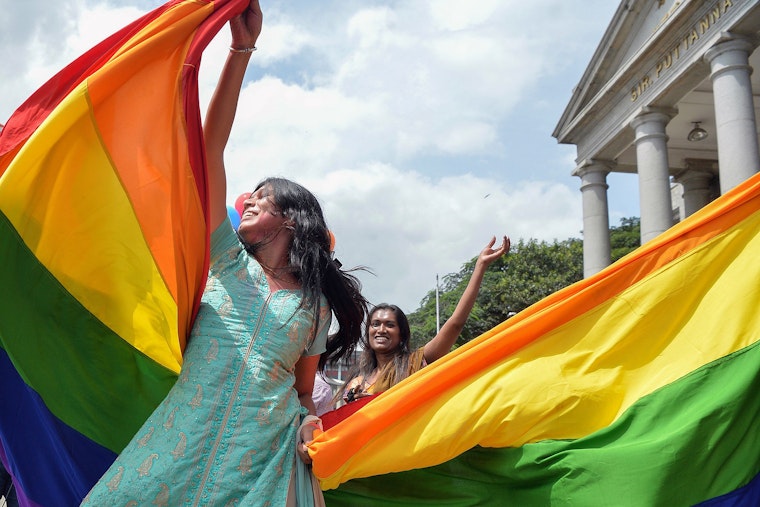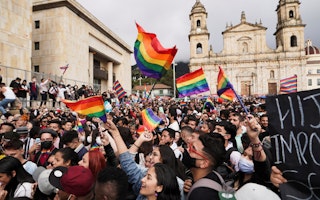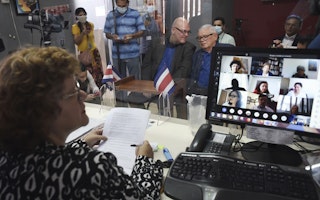A Victory for Equality in India Offers Lessons for the World
By Maxim Anmeghichean

Recently, the Indian Supreme Court decriminalized homosexual conduct in a seminal decision. This victory did not come easily for the Indian LGBTI rights movement. It took 20 years to achieve and was preceded by setbacks and losses along the way.
Yet despite these setbacks, it remained a high priority for the movement. While LGBTI people in India face many human rights concerns, all agreed it was essential to repeal a criminal statute that resulted in tens of millions of members of the LGBTI community in the country being considered, in essence, unapprehended felons—vulnerable to arrests, blackmail, violence, and other rights violations.
At the Open Society Foundations, this is something we believe in profoundly. For this reason for the past decade, we have supported local efforts to decriminalize homosexual conduct around the world—and we are investing in opportunities for activists from different parts of the world to learn from one another.
After the Indian decision was announced, celebrations erupted not only across India but also in many of the other 70-plus countries that still criminalize same-sex attraction. It gave hope that one day homosexual conduct will be decriminalized in these countries too. This day may not be that far away, as the last five years saw positive developments in this direction. For example, in 2016, the Belize High Court became the first in the Anglophone Caribbean to strike down a similar colonial-era law criminalizing consensual homosexual conduct.
This year, meanwhile, a court in Trinidad and Tobago followed suit, although the government has appealed the decision. Activists across the English-speaking Caribbean, the last bastion of criminalization in the Americas, are gearing up for similar litigation in other countries in the region. There is a ray of hope in Africa too following recent decriminalization in Lesotho and Mozambique as the result of comprehensive penal code reforms. A High Court in Kenya is expected to deliver its decision on a decriminalization case later this year. Similar litigation efforts are underway in Botswana.
So what can be learned from the experience of advocates in India, Belize, Mozambique, and other countries that recently decriminalized homosexuality?
Take Your Case to the Court of Public Opinion
While inside-the-courtroom legal strategy is important, changing hearts and minds in the court of public opinion is equally important. For example, after their earlier Supreme Court loss in 2013, activists in India doubled down on creative campaigning, communications, and media engagement as the case was reheard by the Supreme Court. They also made numerous allies, including vocal public figures. And while last week’s decision may still be ahead of public opinion, Indian society shifted considerably towards more positive views on homosexuality. Changing public opinion seems to have softened the political ground, making it easier for the court to rule in favor of recognizing LGBTI rights.
Do Not Be Afraid to Lose
Losses on the way to decriminalization are often inevitable and should not be perceived as setbacks in the long run. While there are important strategic questions to consider prior to bringing a court case or engaging in legislative advocacy for decriminalization including the danger of backlash or security concerns for the community, fear of losing on your first attempt should not necessarily be one of them. In India, Botswana, and Kenya, among others, activists lost cases before they achieved their first wins. They learned from each loss and came out of it with stronger arguments inside the court and campaigning outside. As one Botswana activist put it to me: “It is not like the time wasn’t right to bring a case then, but it is right now. The time is right today in big part because of the losses we suffered and how we learned from them. Without them, the time would never be right.”
It Does Matter
I grew up in Moldova, where homosexual conduct remained a criminal offense under the old Soviet Penal Code until 1995. Having started activism a few years after decriminalization, I was lucky to have the space to do so—the ability to register an NGO, talk about LGBTI rights publicly, and come out as a gay man and an activist at my university without fear of being expelled – something activists in countries that criminalize homosexual conduct are still fighting for. In my home country, as is the case in many others, decriminalization came way ahead of public opinion (86 percent of Moldovans would not like to have a homosexual neighbor today), but still changed my life and those of many others. By no means is it the end of a struggle, but rather, a step forward in a long journey towards equality. But it changes lives and opens spaces for the LGBTI community to live, express themselves, organize, and advocate for further social change. It matters.
Maxim Anmeghichean is a senior program officer for Equity with the Open Society Global Programs.


